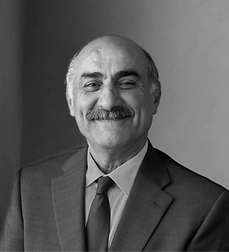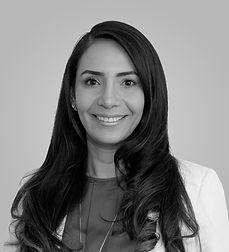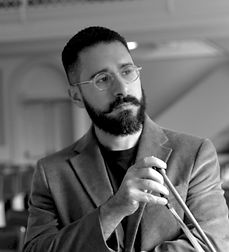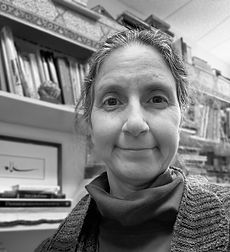RESEARCH
AWARDS
The application period for the 2025 CFSACK Research Awards cycle has now closed.
To receive updates about future award cycles, eligibility changes, and deadlines, please subscribe to our mailing list.
The Canadian Friends of Sufi Arts, Culture, and Knowledge™ (CFSACK®) Research Awards Program is dedicated to advancing the study and appreciation of Sufi arts, culture, and knowledge. The program offers financial support to students and scholars affiliated with higher educational or cultural institutions, enabling them to engage in various academic activities such as fieldwork, archival research, and the organization of scholarly events to promote academic publication.
This year, and with the support of the American Friends of Sufi Arts, Culture, and Knowledge (AFSACK), the program has expanded its eligibility to include applicants affiliated with U.S.-based institutions.
Awarded candidates may potentially have the opportunity to gain exclusive access to the Musée d’Art et de Culture Soufis MTO™ in Chatou, France, upon request and subject to approval. The exclusive access would include complimentary admission to the museum, the opportunity to consult with the museum’s curators and researchers and privileged access to the museum's collections.
Subject areas eligible for the CFSACK Research Awards are wide-ranging and include any research project related to Sufi Art, Culture and Knowledge in fields including, but not limited to, art, art history, fine arts, anthropology, archaeology, architecture, classics, cultural studies, ethnomusicology, history, literature, philosophy, psychology, religious studies, and sociology. This diversity reflects the program's commitment to fostering a comprehensive understanding of Sufi culture across various disciplines.
Please review all documents linked above and our frequently asked questions section, and contact research.awards@cfsack.org with any other questions or clarifications related to the awards program.
AWARDS COMMITTEE MEMBERS

Dr. Angela Andersen
Dr. Angela Andersen holds a doctorate in the history of art. She has worked with not-for-profit organizations, museums, and educational institutions to focus on the role of architecture in human rights and community wellbeing. Her research engages the inter- and intra-religious interactions that take place via the built environment in Muslim contexts, with a focus on the architecture of minority and marginalized groups, including Sufi orders and Alevi lineages. Her publications examine the development and use of Alevi ceremonial sites known as cemevis, the social and legal ramifications of the oppression of these ceremonial settings, and the collection and analysis of oral history and verse as tools for examining the meaning of religious architecture. She teaches courses that explore both contemporary and historical art and architecture. Dr. Andersen was awarded the Margaret B. Ševčenko Prize in Islamic Art and Culture by the Historians of Islamic Art Association and fellowships with SSHRC, the Centre for Studies in Religion and Society at the University of Victoria, the Hamad bin Khalifa Symposium on Islamic Art, and the Aga Khan Program for Islamic Architecture at MIT. She is an Associate Editor with the International Journal of Islamic Architecture and the Program Coordinator of the Epidemic Urbanism Initiative.

Negah Angha
Negah is a Ph.D. candidate at King’s College London, where her research focuses on adab (ethical self-discipline) and khedmat (service) in Sufi communities, exploring their roles in fostering communal well-being and interfaith harmony. She has held academic appointments at King’s College London, Harvard’s Institute of Politics, and the UK Defence Academy. Negah previously served in senior roles at the U.S. State Department and the National Security Council, and later worked in strategic advisory and global market expansion at The Cohen Group. In addition to her academic and policy work, Negah currently serves several nonprofit boards in the U.S., U.K. and France, including the Musée d’Art et de Culture Soufi MTO (MACS MTO) in France and was a founding board member of the American Friends of Sufi Arts, Culture, and Knowledge (AFSACK) from 2019 to 2024.

Dr. William Rory Dickson
Dr. Dickson is an associate professor of Islamic Religion and Culture in the Religion and Culture Department at The University of Winnipeg. He completed a joint-PhD in Religious Studies (2012) at Wilfrid Laurier University and the University of Waterloo, with a specialization in Islamic Studies. As an SSHRC Doctoral Fellow (2010-2011), Dr. Dickson attended the University of Toronto and the University of Copenhagen’s Graduate Research School in Damascus, Syria. His research focuses on contemporary Islam in general and Islamic mysticism (Sufism) in particular. His first book, Living Sufism in North America: Between Tradition and Transformation, explores the ways in which Sufi leaders in North America negotiate Sufism’s to Islam, authority, and gender. He is currently preparing a manuscript with Meena Sharify-Funk for an innovative introductory text on Sufism while continuing a number of research projects on Contemporary Islam. He has travelled throughout the Middle East, including Syria, Egypt, and Morocco.
_edited_edited.png)
Dr. Majid Doroudi
Dr. Majid Doroudi is the Chair of the Board of Directors of CFSACK and its representative on the Research Awards Committee. He is an Associate Professor of Teaching in the Department of Cellular and Physiological Sciences at the University of British Columbia in Vancouver, Canada. Dr. Doroudi has taught Anatomical Sciences, including Gross Anatomy, Embryology, Neuroanatomy, and Histology, to medical, dental, and allied health students for over thirty years. He has been awarded numerous grants to advance the medical curriculum by implementing integrated modules. His passion for this field led him to apply digital media in anatomical sciences education, where he established a YouTube channel to distribute his dissection videos to anatomy learners globally. He has presented his pedagogical research at both national and international conferences. Recognized for his excellence in teaching, he has received the Killam Teaching Award, ten Medical Undergraduate Society Teaching Awards, and the Excellence in Teaching Award from the UBC Faculty of Dentistry. He is the co-author of the textbook M&M Essential Anatomy.

Nooshin Esmaeili - Committee Chair
Nooshin is a Registered Architect in Canada, a sessional instructor, and a Ph.D. scholar at the School of Architecture, Planning, and Landscape (SAPL) at the University of Calgary. After earning her Master of Architecture and before returning to academia, Nooshin worked at several leading architectural firms. She focuses on exploring the 'Sense of Self' within transcendental architecture, investigating how spaces can bridge the inner and outer worlds to foster a state of eudaimonia. She specifically delves into Persian architecture and spirituality, examining them through the lens of Sufism to enrich her research. Nooshin was awarded the prestigious 2023 OBEL Teaching Fellowship that enabled her to teach a 6-month Architectural Studio course on the "Importance of Wellbeing in the Built Environment” at the Royal University of Bhutan (RUB), College of Science and Technology (CST). Additionally, Nooshin is the Chair of the Canada Chapter of the Academy of Neuroscience for Architecture (ANFA), a member of the Transdisciplinary Advisory Committee at the University of Calgary and serves as the president of the Graduate Student Committee for the Canada SSHRC grant, which supports a pan-Canadian partnership focused on “Quality in Canada’s Built Environment: Roadmaps to Equity, Social Value, and Sustainability.”

Dr. Payam Yousefi
Dr. Payam Yousefi (PhD Harvard, 2023) is an assistant professor of ethnomusicology at the University of Florida, specializing in the intersections of music and politics in the Middle East and the US. His work explores the arts, music, and cultural history of Iran and beyond. He is currently a 2025–26 Fellow at the Yale Institute of Sacred Music, where he is completing his book Subversive Sounds: Music and Authoritarianism in Modern Iran, based on eight years of fieldwork. The book examines how musicians’ ethically grounded practices mediate social movements and envision alternative social/political futures. Yousefi’s long-term research on traditional female vocalists in Iran has received multiple awards from the Society for Ethnomusicology, including the Charles Seeger Prize (2019), James T. Koetting Prize (2018), and the Religion, Music, and Sound Section Paper Prize (2023). His forthcoming chapter in Iran Amplified: One Hundred Years of Music and Society (ed. Siamdoust & Chehabi) explores how Iranian women’s vocal performances generate alternative publics that engender contrasting notions of respectability, limiting authority’s power to enforce restrictions. At the University of Florida Yousefi is also affiliate faculty in the Center for Global Islamic Studies and the Center for Arts, Migration, and Entrepreneurship. In addition to this he founded and directs the UF’s Persian Music Ensemble.

Dr. Meena Sharify-Funk
Dr. Meena Sharify-Funk is a Professor in the Department of Religion and Culture at Wilfrid Laurier University. Dr. Sharify-Funk has written and presented several articles and papers on Sufi hermeneutics, women and Islam, and the role of cultural and religious factors in peacemaking. She has also written, co-authored, and co-edited several books including Muslim Women in Contemporary North America: Controversies, Clichés, and Conversations (2023), Contemporary Sufism: Piety, Politics, and Popular Culture (2018), Unveiling Sufism: From Manhattan to Mecca (2017), Encountering the Transnational: Women, Islam, and the Politics of Interpretation (2008), Contemporary Islam: Dynamic, Not Static (2006), and Cultural Diversity and Islam (2003).
FREQUENTLY
ASKED
QUESTIONS
For any additional questions or clarifications, please contact research.awards@cfsack.org. Please check this section from time to time, as new questions received will be answered here.
Who can submit?
Students and fellow researchers affiliated with Canadian or American higher educational or cultural institutions.
Undergraduate and Master's students may apply for awards up to $2,000 CAD.
PhD students/candidates and Postdoctoral Fellows may apply for awards up to $ 5,000 CAD.
Is there an entry fee?
There is no entry fee to apply for the CFSACK® Research Awards.
Can I submit multiple entries?
No, only one entry is allowed per applicant. Please ensure your submission is complete and represents your strongest proposal, as additional entries will not be considered.
What happens after I submit?
After submission, you’ll receive a confirmation email. Submissions are reviewed by the Awards Committee Members, and shortlisted applicants will be contacted within 5- 7 weeks. Finalists will be notified by email with further instructions and next steps.
Can I apply for this award if I conduct my studies outside Canada or the United States?
Yes, as long as you are affiliated with a Canadian or American higher educational or cultural institution.
Must I have already been accepted into a university program to be eligible for the CFSACK Awards?
All applicants should be admitted to a Canadian or American higher educational or cultural institution program to be eligible.
Is a research project application permissible to be submitted by a team of researchers?
Please contact research.awards@cfsack.org for information on team applications and their eligibility.
Do I need prior experience or projects related to Sufism to apply for the CFSACK Awards?
No, prior experience in Sufism-related projects is not necessary, but the proposed research must align with the goals and mission of CFSACK.
Is Canadian or United States citizenship a requirement for applying for the CFSACK Awards?
No, the awards are open to all students affiliated with Canadian higher educational or cultural institutions, regardless of their citizenship status.
Can the award funds be used to cover tuition fees, stipends or research assistantships?
No, the CFSACK Awards cannot be used to pay tuition fees, stipends or research assistantships.
Who is eligible to apply for the CFSACK Awards?
All undergraduate, master's, doctoral candidates, and postdoctoral fellows whose research or projects relate to the missions and goals of CFSACK are eligible to apply.
What should I do if I do not have a supervisor to provide a letter for my application?
If you do not have a supervisor, please contact research.awards@cfsack.org for options for alternative supporting documentation.
What documents are required when submitting my application?
Please refer to the application instructions and the guidelines section in the Online Application Portal for a detailed checklist of all required documents.
Can I apply for this award as an online student outside of Canada or the United States?
Yes, remote online students affiliated with Canadian and American institutions are eligible.
Are there specific GPA or academic performance requirements for the CFSACK Awards?
The application details will specify if there are any GPA or academic performance requirements.
How will I determine if I have been selected for the award?
Award recipients will be notified via email.
What is the application deadline for the CFSACK Awards?
The application deadline is October 13, 2025, 23:59 PDT.
What materials do I need to submit?
Please refer to the application instructions and the guidelines section in the Online Application Portal for a detailed checklist of all required documents.
-
One-Page Cover Letter
-
Submit Application
-
Resume or Curriculum Vitae (CV)
-
References
Can I edit my submission after submitting?
Yes, you may edit your application at any time before the submission deadline. After the deadline, applications are locked and no further changes can be made. Please ensure your submission is complete and includes all required documents, as incomplete applications will not be reviewed.
How are winners announced?
After the committee completes its review, all selected award recipients will be notified directly via email. Please ensure your contact information is accurate and up to date.
What happens if I miss the deadline?
If you miss the submission deadline, you will not be eligible for this cycle. However, you are welcome to apply again during the next round of applications.
What format should supporting materials be in?
All supporting documents must be clearly labelled and submitted in PDF or JPG format. This helps ensure your application is reviewed smoothly and efficiently.
For any additional questions or clarifications, please contact research.awards@cfsack.org.
